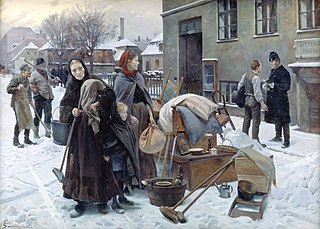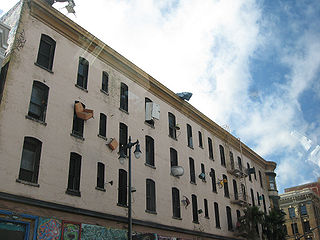
Public housing is a form of housing tenure in which the property is usually owned by a government authority, either central or local.
Rent control in the United States refers to laws or ordinances that set price controls on the rent of residential housing to function as a price ceiling. There is a consensus among economists that rent control reduces the quality and quantity of housing. Neighborhood stability is increased when rental prices are kept in check.

A landlord is the owner of a house, apartment, condominium, land, or real estate which is rented or leased to an individual or business, who is called a tenant. When a juristic person is in this position, the term landlord is used. Other terms include lessor and owner. The term landlady may be used for female owners, and lessor may be used regardless of gender. The manager of a pub in the United Kingdom, strictly speaking a licensed victualler, is referred to as the landlord/lady.

Eviction is the removal of a tenant from rental property by the landlord. In some jurisdictions it may also involve the removal of persons from premises that were foreclosed by a mortgagee.
Section 8 of the Housing Act of 1937, often called Section 8, as repeatedly amended, authorizes the payment of rental housing assistance to private landlords on behalf of low-income households in the United States. Fort Lauderdale, Florida Housing Authority Director William H. Lindsey, upon the advice of Housing Authority attorney J. Richard Smith, initially developed 11(b) financing in the early 1970s to accommodate a local savings and loan interested in assisting with urban renewal projects Mr. Lindsey eventually brought to fruition. This was the initial impetus for the subsequent development of the now well known Section 8 Program. Of the 5.2 million American Households that received rental assistance in 2018, approximately 2.2 million of those households received a Section 8 Housing Choice Voucher. 68% of total rental assistance in the United States goes to seniors, children, and those with disabilities. The U.S. Department of Housing and Urban Development manages Section 8 programs.
Subsidized housing is government sponsored economic assistance aimed towards alleviating housing costs and expenses for impoverished people with low to moderate incomes. In the United States, subsidized housing is often called "affordable housing." Forms of subsidies include direct housing subsidies, non-profit housing, public housing, rent supplements, and some forms of co-operative and private sector housing.

A rent strike is a method of protest commonly employed against large landlords. In a rent strike, a group of tenants come together and agree to refuse to pay their rent en masse until a specific list of demands is met by the landlord. This can be a useful tactic of final resort for use against intransigent landlords, but carries the obvious risk of eviction and bad credit history in some cases.

Single room occupancy is a form of housing that is typically aimed at residents with low or minimal incomes who rent small, furnished single rooms with a bed, chair, and sometimes a small desk. SRO units are rented out as permanent residence and/or primary residence to individuals, within a multi-tenant building where tenants share a kitchen, toilets or bathrooms. SRO units range from 7 to 13 square metres. In the 2010s, some SRO units may have a small refrigerator, microwave and sink.
A slumlord is a slang term for a landlord, generally an absentee landlord with more than one property, who attempts to maximize profit by minimizing spending on property maintenance, often in deteriorating neighborhoods, and to tenants that they can intimidate. Severe housing shortages allow slumlords to charge higher rents, and when they can get away with it, to break rental laws.

The Mitchell-Lama Housing Program is a non-subsidy governmental housing guarantee in the state of New York. It was sponsored by New York State Senator MacNeil Mitchell and Assemblyman Alfred Lama. It was signed into law in 1955 as The Limited-Profit Housing Companies Act.
Rental value is the fair market value of property while rented out in a lease. More generally, it may be the consideration paid under the lease for the right to occupy, or the royalties or return received by a lessor (landlord) under a license to real property. In the science and art of appraisal, it is the amount that would be paid for rental of similar real property in the same condition and in the same area.

Subsidized housing in the United States is administered by federal, state and local agencies to provide subsidized rental assistance for low-income households. Public housing is priced much below the market rate, allowing people to live in more convenient locations rather than move away from the city in search of lower rents. In most federally-funded rental assistance programs, the tenants' monthly rent is set at 30% of their household income. Now increasingly provided in a variety of settings and formats, originally public housing in the U.S. consisted primarily of one or more concentrated blocks of low-rise and/or high-rise apartment buildings. These complexes are operated by state and local housing authorities which are authorized and funded by the United States Department of Housing and Urban Development (HUD). More than 1.2 million households currently live in public housing of some type.

Landlord–tenant law is a part of the common law that details the rights and duties of landlords and tenants. It includes elements of both real property law and contract law.
The Ellis Act is a 1985 California state law that allows landlords to evict residential tenants to "go out of the rental business" in spite of desires by local governments to compel them to continue providing rental housing.
Discrimination in awarding Section 8 housing describes alleged or confirmed cases of illegal discrimination in the housing market of the United States of America, "Section 8" being a portion of a 1937 law that provides financial assistance for housing costs of several million low-income Americans.

Rent regulation is a system of laws, administered by a court or a public authority, which aims to ensure the affordability of housing and tenancies on the rental market for dwellings. Generally, a system of rent regulation involves:

Janet Freeman was a community organizer and activist for tenant's rights in New York City's lower Manhattan. On June 20, 2013, the corner of Elizabeth Street and Kenmare Street was co-named "Janet Freeman Way" by the New York City Council in her memory and to commemorate her activism on behalf of the community. According to NYC Streets in its listing of street names and their honorees, "Janet Freeman was a community organizer and tenant advocate. She founded the Croman Tenants Association; the Coalition to Protect Public Housing and Section 8; and Co-op Watch, to prevent evictions through phony conversions. She started campaigns to organize tenants against aggressive landlords, phony demolitions, and harassment in and around Chinatown and Little Italy."
The Costa–Hawkins Rental Housing Act ("Costa–Hawkins") is a California state law, enacted in 1995, which places limits on municipal rent control ordinances. Costa–Hawkins preempts the field in two major ways. First, it prohibits cities from establishing rent control over certain kinds of residential units, e.g., single-family dwellings and condominiums, and newly constructed apartment units; these are deemed exempt. Second, it prohibits "vacancy control", also called "strict" rent control. The legislation was sponsored by Democratic Senator Jim Costa and Republican Assemblymember Phil Hawkins.
The Metropolitan Council on Housing is a tenant rights organization in New York City founded in 1959. As the oldest and largest tenants' organization in the city," it has focused on issues including rent regulation and affordable public housing.

Cancel rent is a slogan and tenant rights movement in the United States, which advocates for the cancellation of rental payments and suspension of mortgage payments during the coronavirus pandemic. Activists and organizations have also presented other demands, which include the cancellation of housing-related expenses, cancellation of late fees for housing payments, the establishment of a landlord hardship fund, an increase in emergency housing, and an eviction moratorium. The movement was triggered by the economic impact of the pandemic, in which mass business closures and employee layoffs resulted in financial insecurity for many Americans. Tenants faced a range of issues, including the inability to pay rent, harassment or intimidation from landlords, and potential eviction. This situation put tenants at risk of damaged credit ratings, food insecurity, and homelessness. Consequently, activists, tenants rights organizations, and some politicians have called for the cancellation of rent.










